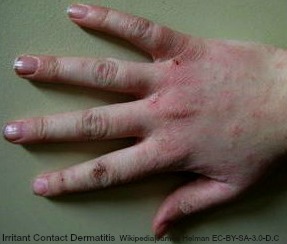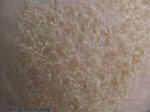Irritant Contact Dermatitis.
A Common Type Of Eczema Where Avoiding Irritants Is Key
Irritant Contact Dermatitis (ICD) is the more common of the two types of contact dermatitis.
It affects 8 out of 10 sufferers of contact dermatitis.
The skin inflammation in this condition is caused by the skin coming into contact with irritants.

An irritant is a substance that aggravates the skin but doesn’t cause an allergic reaction.
They aggravate the skin by stripping away the body's natural oils, called sebum. This causes the top layer of the skin to become damaged.
Symptoms
The damage to the skin can make it
The symptoms of irritant contact dermatitis normally appear almost instantly. If the skin is not treated then it will not improve. Skin may crack. This will allow irritants to enter the skin and damage it further.
This will cause more skin inflammation.
The breaks can also allow bacteria to enter. This can cause an infection to your eczema.
Causes
The irritants that cause the problem are usually solvents.
Solvents are normally a liquid. They are the part of a product that dissolve another substance. Like bleach in a household cleaner that dissolves dirt from a kitchen worktop.
These products can always be found in homes and places of work.
Examples are
- household cleaners
- hygiene products
- DIY products
- bleach
Other substances known to cause a problem include
- soil
- sand
- certain plants
- food
Quite a few jobs use the products listed. As they are used all day in some work environments they can be a high risk to the worker.
When eczema is caused in a work environment it is generally classed as Occupational Dermatitis.
Irritant Contact Dermatitis Treatment
The best ways to prevent and treat an outbreak of irritant contact dermatitis are
- work out what the trigger irritants are
- avoid the triggers as much as possible
- use gloves around irritants
- find substitute products, without the trigger
- use emollients frequently
- use topical steroids to reduce inflammation
- avoid scratching, it encourages damage and infection
If it gets infected then oral antibiotics may be prescribed.
If you look after your skin it will hopefully not get to the infection stage.
Diagnosis
Your doctor should be able to diagnose the condition from looking at the skin.
By asking you questions they will probably work out that you get a flare up after contact with certain things, especially if you have noticed it.
Most people's skin would not normally be affected by everyday contact of a potential irritant. Like with soap, when washing your hands.
But if the action is repeated day in and day out, like medical staff washing their hands, it could affect the skin. Because of this, it may appear at any time during your life.
If you have or have had atopic eczema then you are more prone to it.
It is very uncommon in children. They haven’t had much exposure to the common irritants.
It is mainly found on the hands, especially along the edges of the fingers. The hands are the area that come into contact with things the most.
Personal Story
I have irritant contact dermatitis. It mainly affects my hands. I can manage it quite well now. I know what irritates my skin.
Anything with perfume in is a big problem. Sometimes walking through some of the department stores with their smelly counters, as I call them, makes my skin sting. So I try and stay away from them. which can be difficult as they are always at the front of the store!
I use latex free gloves at home to do any cleaning. Or I just use my eczema as an excuse to get out of it. I’m not encouraging it, but I hate washing up so it works well for me!
When cooking I also wear gloves. My problem foods are onions, garlic, cheese and citrus fruits. Unfortunately I love them all, and I like onion in everything!
I constantly moisturise, throughout the day. It helps to limit any damage done.
Having this type of eczema can be very time consuming. You have to think about everything you do. But now having it and looking after my skin are natural to me.
Once you know your triggers and the best preventions and treatments for you, it makes life much easier.
Return from Irritant Contact Dermatitis to Types of Eczema
Return from Irritant Contact Dermatitis to What is Eczema
Search What Is Eczema?
Advertising on What Is Eczema?
We are a participant in the Amazon Services LLC Associates Program, an affiliate program which allows sites to earn fees by advertising and linking to amazon.com. If you make a purchase through a link on this page, I may receive a small commission, at no extra cost to you. Many thanks
